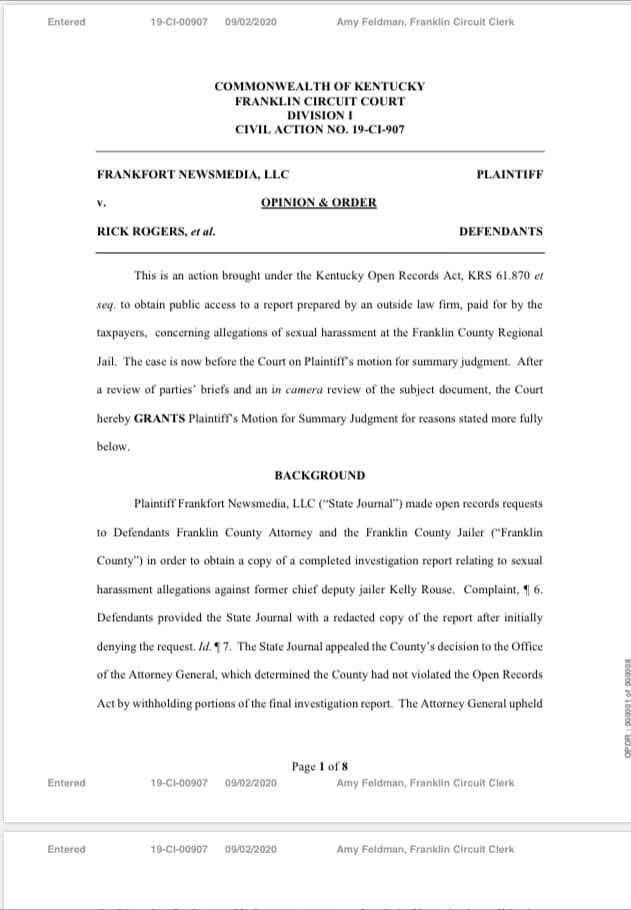

"The taxpayers paid for this report. They have a right to review it in full."
This is how Franklin Circuit Court Judge Phillip Shepherd concludes his September 2 opinion affirming The State Journal's right to an unredacted copy of an investigative report into complaints of sexual harassment in the Franklin County Jail that the Franklin County Attorney improperly characterized as a permanently exempt criminal investigation record.
The investigation was conducted by an outside law firm, at taxpayer expense, "to review allegations concerning working conditions at the Franklin County Regional Jail, and whether there was evidence to substantiate allegations of 'workplace behavior constituting a sexually hostile, or sexually harassing work environment.'
"By its own terms, the report is dealing with a *human resources* matter, not a criminal investigation."
In 2018, The State Journal requested "the completed report from the investigation of a sexual harassment claim against Kelly Rouse."
The Franklin County Attorney denied the newspaper's request, arguing that the report was a preliminary record, a record shielded from disclosure by the permanent exception for county attorney criminal litigation files, and "attorney-client work product."
The State Journal appealed the denial to the Kentucky Attorney General. In 2019, a nonmerit staffer in the attorney general's office authored a laughably bad open records decision affirming the county attorney's denial based on an exception to the open records law that authorizes permanent nondisclosure of "records or information compiled and maintained by county attorneys or Commonwealth's attorneys pertaining to *criminal investigations* or *criminal litigation*."
https://ag.ky.gov/Priorities/Government-Transparency/orom/2019/19ORD152…
Recognizing that the decision represented a dangerous and utterly absurd precedent, The State Journal appealed to the Franklin Circuit Court.
State Journal counsel Jeremy Rogers challenged the county attorney's original denial of the newspaper's request based on the county attorney's specious claim that the report was a criminal litigation record of his office as well as his heavy handed redaction of a copy of the report that he subsequently disclosed.
Rogers—a highly regarded First Amendment attorney and open records and meetings litigator—is a partner at Dinsmore & Shohl and a Kentucky Open Government Coalition director.
The court concurred with the newspaper in concluding that "the investigation report does not function to detect or investigate criminal violations, nor does the mere fact that the report is in the possession of the County Attorney exempt the report disclosure."
(Important lesson here for county and Commonwealth's attorneys who mistakenly believe that the permanent exception for records they compile pertaining to *criminal investigations* or *criminal litigation* erects a barrier to all records in their custody. Non-criminal investigation/litigation records, as well as financial and operational records, are open to inspection unless otherwise exempt.)
https://apps.legislature.ky.gov/law/statutes/statute.aspx?id=48230
The court also agreed that the privacy rights of complainants and the jailer must yield to the public's interest In determining "whether county agencies—funded by taxpayer dollars—are efficiently and effectively investigating and addressing employee misconduct."
The complainants were not identified in the report and the jailer engaged in misconduct "in a public workplace while being paid by taxpayers." He therefore had no privacy rights.
Here, as in opinions involving the Finance Cabinet and the Labor Cabinet issued last year, Judge Shepherd "found that the public's interest in reviewing the records of sexual harassment allegations outweighed the privacy interests of the public employees," and ordered the information redacted by the county attorney to be released to The State Journal.
(Another important lesson for public officials here. The privacy exception to the open records law does not shield public employee misconduct occurring in a public workplace during public work hours from public scrutiny even if that conduct is *inconvenient or embarrassing*.)
https://apps.legislature.ky.gov/law/statutes/statute.aspx?id=23058
Once again, the Franklin Circuit Court demonstrates a clear understanding of the disinfecting power of sunlight by firmly resolving the records access issue before it in favor of public access.


